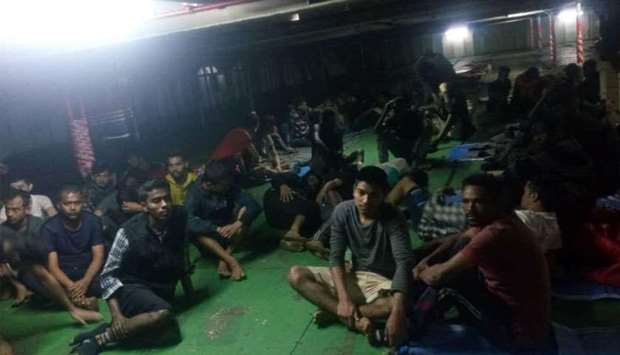The refusal by dozens of migrants to leave a cargo ship off Libya is a ‘dangerous mutiny’ that can encourage more of such behaviour in the future, an official in the strife-torn country's navy warned on Saturday.
Some 80 migrants are barricading themselves aboard the Panama-flagged vessel now docked in Libya's western port of Misrata more than a week after the ship picked them up from their sinking boat at the request of the Libyan coastguard.
‘The migrants' mutiny can prompt commercial ships to shun carrying out rescue operations that they are sometimes requested to do due to being near sinking migrant boats,’ Ayoub Qasim, a spokesman for the Libyan navy, told dpa.
‘This mutiny is very dangerous. It can happen against other ships, the navy personnel or the coastguard,’ he added.
On Wednesday, 14 out of the original 94 migrants left the ship following negotiations and were transferred to an accommodation centre in Misrata.
The remaining migrants insist on travelling to Europe.
Colonel Tawfik Amohammed, a regional Libyan coastguard chief, said on Saturday that negotiations were ongoing to convince the migrants to leave the ship.
A committee of representatives from the Libyan coastguard and security agencies as well as international organizations are engaged in the negotiations.
The official told dpa that he expects the stand-off to end soon, without giving details.
Rights group Amnesty International has said that the migrants are refusing to disembark for fear of detention and torture in Libya.
‘The protest on board the ship ... gives a clear indication of the horrifying conditions refugees and migrants face in Libya's detention centres where they are routinely exposed to torture, rape, beatings, extortion and other abuse,’ Heba Morayef, Amnesty's Middle East and North Africa director, said in a statement on Friday.
The watchdog reported that a number of those on the ship said they had earlier been subjected to human rights abuses in Libya.
‘It is high time the Libyan authorities put an end to the ruthless policy of unlawfully detaining refugees and migrants,’ Morayef added.
Libya descended into chaos following the 2011 armed revolt that toppled long-time dictator Moamer Gaddafi. The North African country has since emerged as a gateway to Europe for people fleeing war, persecution and poverty in their homelands.
In recent months, the Libyan coastguard has reported intercepting various boats carrying hundreds of migrants headed for Europe via the Mediterranean Sea.

